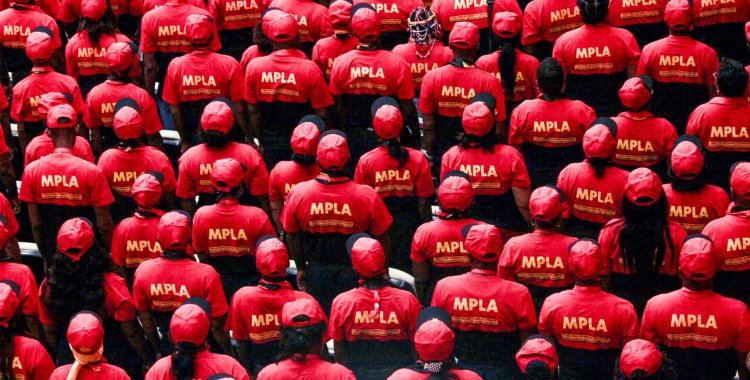"The question of the ideological nature of the MPLA, as I demonstrate in my book 'Guerrilhas e Lutas Sociais' [2018, Mercado das Letras] resulted from a somewhat forced and non-consensual proclamation", he considers.
Mabeko-Tali, who presents his most recent work, "Rótulos Atribuídos, Rótulos Assumidos" [2023, Guerra e Paz Editores] this Wednesday in Lisbon, is of the opinion that, first of all, it is important to "know how many Marxists there were then in the MPLA".
The Marxist path was decided at the congress that the MPLA held in December 1977, in the wake of the events of May 27th of that year.
On May 27, 1977, an alleged attempted coup d'état, in an operation that was led by Nito Alves – then former Minister of Internal Administration since independence (November 11, 1975) until October 1976 – was violently repressed by the regime of Agostinho Neto, first President of Angola.
Six days earlier, the MLPA had expelled Nito Alves from the party, which led the former minister and several supporters to invade the Luanda prison to free other sympathizers, taking control of the national radio station in parallel, a movement that became known as "fractionism ".
Troops loyal to Agostinho Neto, with the support of the Cuban military, ended up establishing order and arresting the rebels, followed by what became known as the "purge", with the elimination of the factions, with around 30 thousand people killed, mostly without any connection to Nito Alves, as stated by Amnesty International in several reports on the subject.
Based on the labels that the three liberation movements – MPLA, National Front for the Liberation of Angola (FNLA) and National Union for the Total Independence of Angola (UNITA) – exchanged with each other, Jean-Michel Mabeko-Tali seeks to reveal the role instrumental of what can be considered mainly accusations, attributed and/or assumed, that justify factional motivations.
"The book is fundamentally intended, on the one hand, to examine the labels between liberation movements, since the time of the armed struggle and, on the other hand, to examine this same exchange of labels within the MPLA", he explains.
"Because it seemed that the Angolan process was centered around these types of accusations: communist here, reactionary there, and this has always fascinated me. Hence this project", he adds.
The ideological option for Marxism is linked to the events of May 27, 1977 and Mabeko-Tali argues that the number of Marxists in the MPLA's management bodies was small and without attracting support within the party.
"The essence of the book revolves around the exchange of labels within the MPLA itself", in a verbal confrontation that dates back to the founding of the party that "translated factional struggles".
In the work, Mabeko-Tali highlights the role of Nito Alves, the central figure "of this long crisis that led to the 27th of May and which he defines as" the greatest tragedy in the history of the MPLA, whose consequences still divide Angolan society ".
"I try to study Nito. I try to understand Nito, because the 27th of May until now, and I say right at the beginning of the book, things are summarized in terms of how many were killed, how many survived and no one at any point tries to understand Nito ", he highlights.
"I try to study the person. Nito as a product of a society, as someone who was born in the colonial period, as someone who was a victim of colonial racism and as someone who, at the same time using Marxist terminology, did not know how to replace the problem of racism, unlike the MPLA tradition, which avoided this debate during the armed struggle, Nito does not avoid the debate", he highlights.
Asked about the decision of the current President, João Lourenço, to return the remains of the victims of May 27th to their respective families, a process marked by controversy after DNA analyzes concluded that the remains did not correspond to the victims, Mabeko-Tali begins by welcome the measure.
"There was a real effort on the part of João Lourenço, in my opinion, I have no reason to think otherwise, sincerely, wanting to reconcile Angolans on the issue of the 27th of May. That's one thing. Another thing was when I heard about the issue of the bones. Given the confusion about where the people were buried, and the little information I had in the way of information repeated over the years regarding the fate of the bodies of many of them, my question was: but how are you going to find the bones", he adds.
"So, my doubt now about the motivations, I suppose they were part of this desire to reconcile Angolans, unless there was – I don't want to be assertive at this level – there was an electoral concern. After all, there were elections in sight I can't speak assertively, but this is my doubt", he acknowledges.
Born in the Republic of Congo, Jean-Michel Mabeko-Tali has a PhD in History from the University Paris VII – Denis Diderot, a master's degree in African Studies from the University Bordeaux III and a degree in History and Geography from the University of Saint-Etienne, in France.
Living in Angola in 1976, he taught in high school and at the Agostinho Neto University. In 2002, he moved to the United States, where he is a professor of African History at Howard University in Washington.







